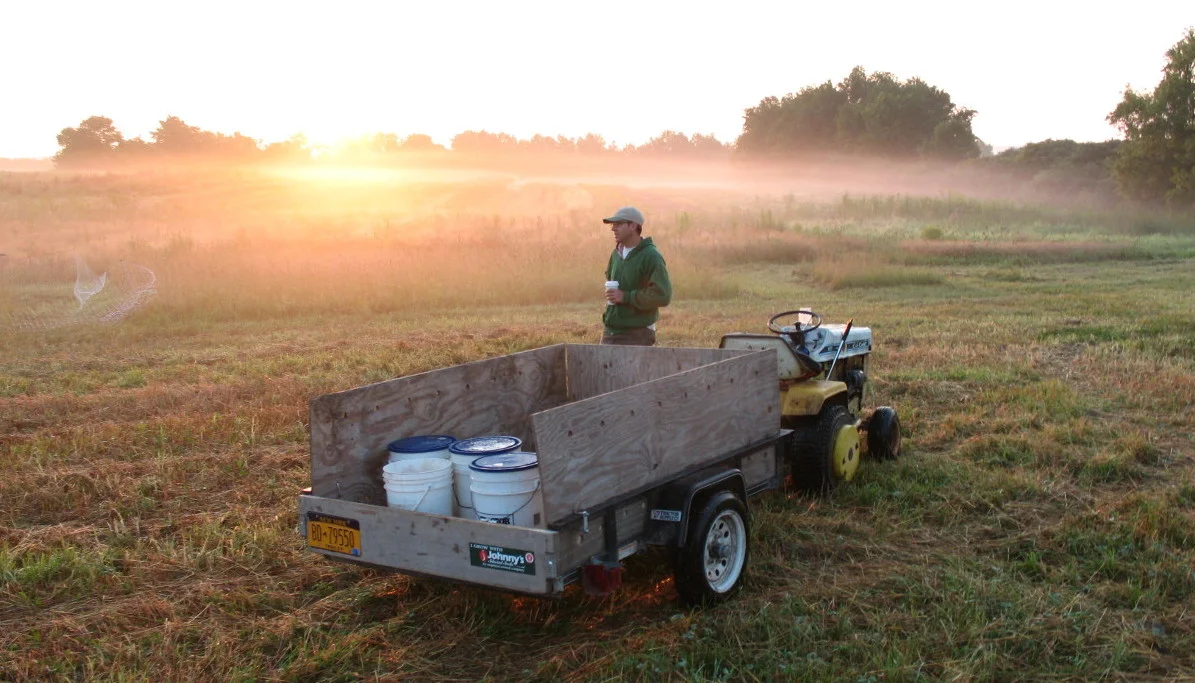The Lure of Seeds: Deciphering the Seed Catalog
/One of the hardest things about farming is avoiding buying too many amazing seeds at this time of the year. Outside, it’s gray and gross and cold, but inside are fantastic catalogs filled with amazing color and mouth-watering beauty.
I try to control myself (it gets insanely expensive fast if I don’t!), but a few things always slip though… this year that heirloom red Romano bean just wouldn’t stop staring at me. Or all the other sprouting broccolis and cauliflowers that proliferated in the catalogs (guess we weren’t the only ones who had a delicious trial with them last year!). What about that new speckled lettuce? Or fancy new carrot? Or sweeter Sugar Snaps? And I can’t even look at tomatoes anymore.
But after years of buying, growing, and trialing seeds, I’ve finally learned to take some of the descriptions with a grain of salt.
For instance, last year a particular winter squash a particular winter squash enticed us with it’s claim as “the squash of choice for the apocalypse.” Surely, we thought, this would be a great option for our at times extreme site in Fenner? And if the world ends, at least we’d have seeds from one crop.
What we learned this description actually meant was a plant that easily grew 30 to 40 foot vines that reached across one field, across the road, and into the high tunnel where it attached itself to the eggplant and tomatoes. Each of these vines only held one fruit, which perfectly blended in with the grass, leading to multiple incidents involving mowers (mower-0, squash-2), tripping while carrying totes of tomatoes (a saucy scene), and at least five incidences of face planting, including one by the dog, at which point she savaged the offending squash (unsuccessfully—you need a power saw to cut into them). I will admit, their flavor is fabulous, but we aren’t growing those bad boys again unless the apocalypse really is nigh.
So in the interest of helping out fellow farmers and gardeners, here’s our guide to interpreting the real meaning of all that flowery language in your vegetable catalogs:
“Prolific.”
50/50 chance that you either get a nice decent supply of the crop, or that you get so much of the crop that your CSA members begin to threaten to shove it back where it came from or start a petition against it. (sorry, guys)
“Might self-seed.”
Definitely, for sure, and completely a 100% probability that everyone of the 400 million seeds created by this crop will come back and choke out all other living entities on that piece of ground for centuries. See: husk cherries, tomatillos, some tomatoes, and that unidentified flower that we grew in 2013 that never seemed to form a flower, yet somehow produced seedlings that keep regenerating today.
“Needs a long season.”
Won’t produce fruit north of the Mason Dixon line, but will grow big enough to smother out the hardworking and producing crops next to it, while convincing even the most hardened skeptic of a farmer that surely it will produce fruit next week, right? Aka, why we have sadly stopped trying to grow sweet potatoes up here in Fenner.
“Commercial standard.”
90% odds that it tastes like cardboard. See also:
“Better Flavor than other Varieties.”
We don’t want to emphasize this, but all our other varieties of this crop taste like cardboard.
“Fancy,” “Elegant,” or “Parisian.”
These fruits are going to be just enough smaller than other varieties to become a complete PITA to harvest, leading to fights among the crew over who has to pick them, which generally end up in comparison of hand sizes and forcing the smallest handed person into a harvest season of misery. (Matt always gets out of these, not that I’m bitter or anything!)
“Dependable” or “Reliable” or “Easy.”
Even if you have a brown thumb, you think you should be able to grow this. You pour your heart and soul and sense of self-worth into it for a season, and then when it doesn’t do well for you, it plunges you into deep gardening despair. [Pro tip for home gardener or gardener wanna-be mental health: sometimes those who are writing the descriptions are writing for a totally different place than where you live—don’t take it too hard!]
“Longer harvest period”
You won’t have to check on these every ten minutes to get them picked when they are perfectly ripe. Hopefully this also means that your poor CSA members don’t have to eyeball another 4 pound zucchini!
“Bold” or “Intense Flavor.”
At least one child will cry after eating this. Or maybe an adult. They then won’t make eye contact with you anymore at the farmers market for fear of being asked if they want more of the veggie. [Farmer pro tip: if engaging in hot pepper eating contests, make sure you get the first bite at the pepper since the tips are often less spicy than the middle!]
“Unique.”
No one, including you as the grower, will have any idea on how to use this vegetable. You can tell people to “just saute it,” but inside you ask yourself: can they really? Is this crop even edible or just a sick ploy to entice you to buy more seeds? [Funny thing, a few winters ago I bought a frozen package of spinach at Wegmans (I know, even veggie farmers start jonesing for veggies mid-winter) and it was disgusting. I ended up spreading out the leaves to examine them and realized that the whole package, which likely means whole trailer loads of frozen “spinach” was actually Garden Dock, a super common weed that vaguely looks like spinach. I guess even the big guys make mistakes?.]
“Heavy” or “Dense.”
One or more people on the farm will throw out their back while harvesting this, and it’s likely going to be you. Make sure you update your workers compensation policy in advance. On the bright side, at least it’s better filling out an accident report that the box was too heavy, rather than filling out one about how someone tripped over a post-apocalyptic squash!
I hope this helps fuel your seed dreams—we can’t wait to get our tasty starts to summer planted now!
And for those who wonder, we buy most of our seed from High Mowing Seeds out of Vermont or Johnny’s Selected Seeds out of Maine. But other companies that we love and recommend include Fruition Seeds and Hudson Valley Seed in NY, Baker Creek in Missouri, and Fedco Seeds in Maine.





